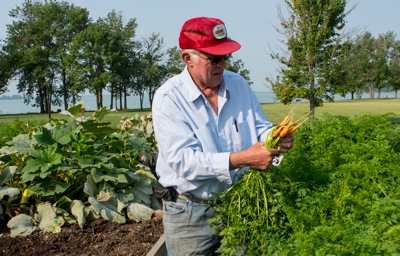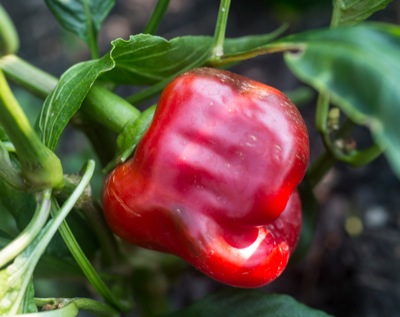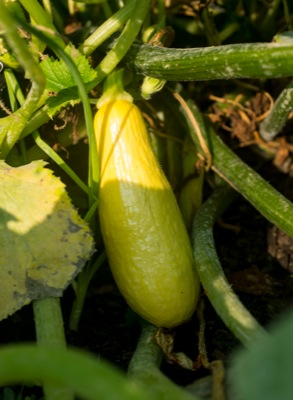Saturday, September 5th, 2015
Gardeners have that rainy day feeling
Heavy summer precipitation, lack of sunshine put damper on yields
By Claire Giesige

Photo by Mark Pummell/The Daily Standard
Ron Kremer, who helps coordinate the Wright State University-Lake Campus community garden, on Wednesday morning thins a patch of carrots at the Celina campus.
As harvests continue, local gardeners are noticing the detrimental effects of record-setting rains in June.
"We're OK but we're not doing as well as last year," said Ron Kremer, a coordinator of the Wright State University-Lake Campus community garden. "Last year we did about 2,500 pounds (of produce). At last count, we're at about 1,600."
Heavy rainfall diminished plant production, he said. But more than anything, the cloudy weather was the most damaging factor; the lack of sunshine hindered plant growth in the first half of summer, he said.
"We didn't have that all important aspect of photosynthesis," Kremer said.
The community garden - where most of the plants were in raised beds - withstood the record-setting 12.99 inches of rain in June.
"Normally, the drawback of a raised bed is that you have to water more frequently," Kremer said, adding this year's weather took care of that.
Produce from the WSU-LC garden is donated to the CALL Food Pantry in Celina and Agape Ministries in St. Marys.
"If the weather stays good, we may reach last year's total. If the frost doesn't hit early, we'll do well," Kremer said. "But you win some, you lose some."
Dian Steele, who has a plot at the Celina community garden, was not affected by the ugly June weather. In fact, she said her garden did rather well this year.
"I was surprised. I had green beans, squash, lettuce, watermelon and peppers, which all did well," Steele reported. "Tomatoes, not so much, but overall it was better than most years."
Steele has a theory as to why her garden flourished.
"I know a lot of people who didn't do that well but I think I had better drainage," she said.
Steele, like Kremer, utilized a raised bed for her plot.
"I certainly didn't have to water as much," she laughed.
Another area gardener, Skeet Wolters of Coldwater, did not fare as well this summer at the fickle hands of Mother Nature.
"This year nature has been unkind in Mercer County," Wolters said. "Our plot is in a low area and the corn spent days underwater."
Despite the puddles, her garden managed to produce a little something to reward her for her efforts.
"What we did harvest was delicious but very, very small," she said.
Wolters noted that many of the plots in the Coldwater community garden, where hers is located, are abandoned and overrun with weeds. This is an easy mistake to make, according to Denny Riethman, OSU Extension ag educator for Mercer County.
"People might have given up on trying to control weeds this year," he said. "But that's just going to come back to haunt them next year."
Allowing weeds to take over a garden, Riethman explained, results in greater numbers of weed seeds, wreaking havoc the next year.
The dreaded task of weeding likely took area gardeners more time than usual this summer. While garden crops might be down, weed crops, so to speak, are up.
"From what I've heard from a lot of people, the rain has had a big effect on weeds," Riethman said. "They're able to make it through the wet weather better."
Riethman offered suggestions for local gardeners to prevent water damage in the future if the rains return next year.
"The biggest thing they could look at is to try to improve drainage. If their garden isn't too big, they might look at going to a raised bed garden," he said.
Additionally, incorporating organic matter such as compost and manure helps to give better movement to the soil, aiding garden drainage, he said. It also has the added benefit of enriching soil nutrient quality, he added.
While the rough growing season meant local green-thumbs lost more than they won, gardeners often are a resilient bunch, Wolters said.
"Next year is another year," she said. "Gardeners have short memories and come spring they are ready to try again."

Photo by Mark Pummell/The Daily Standard
Among the vegetables grown this summer at the Wright State University-Lake Campus, Celina, are red peppers. Many area gardeners told the newspaper that heavy rains and reduced sunshine affected their yields this season.

Photo by Mark Pummell/The Daily Standard
Among the vegetables grown this summer at the Wright State University-Lake Campus, Celina, are yellow squash. Many area gardeners told the newspaper that heavy rains and reduced sunshine affected their yields this season.




